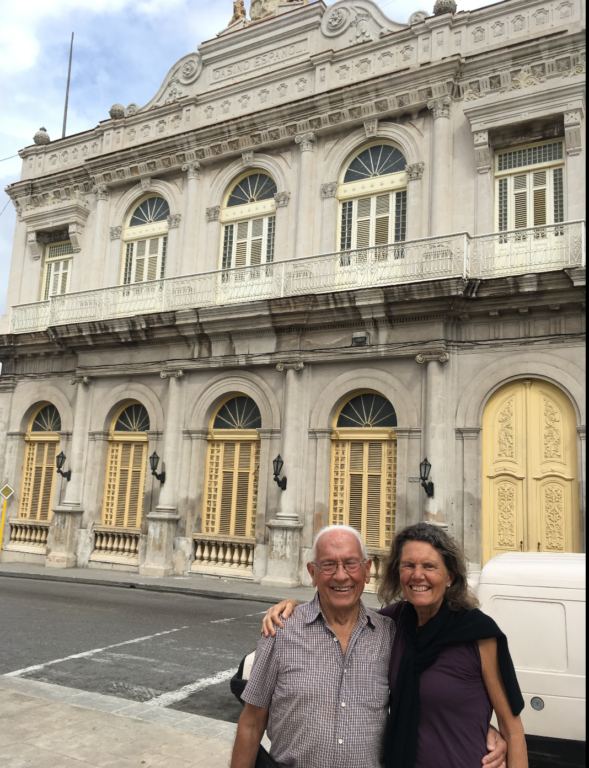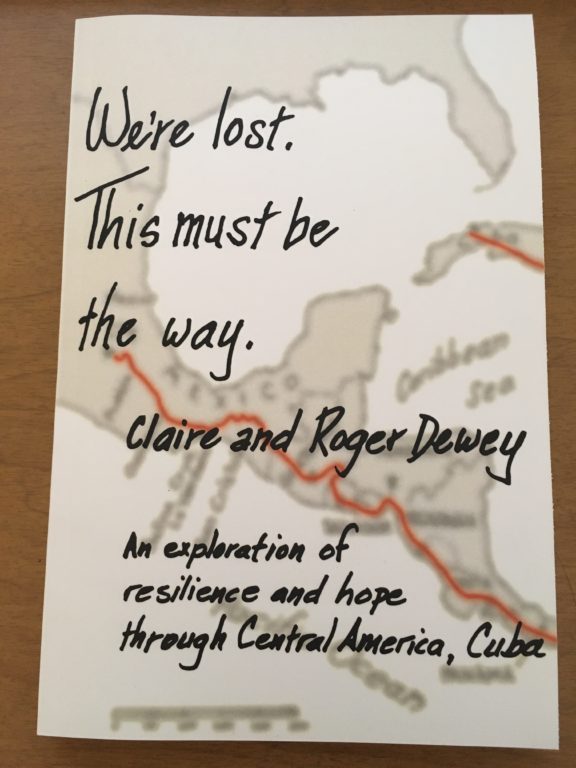“We deliberately sought to understand the histories of these countries. We wanted to help heal the fears that divide us from these resilient people. We hoped our style of travel could demonstrate that a real God exists who can be relied on in even the harshest insecurities.”
This week, we want to feature a blog written by Roger and Claire Dewey, who recently published a book based on their four-month ‘walk’ through Central America and Cuba. Roger was called in 1968 to work against the racism in the Church, founding Christians for Urban Justice. Claire joined him in 1977, teaching in the public schools and raising their family in Dorchester, where they still live. They are members of Reservoir Church in Cambridge, and all profits from their book entitled “We’re Lost. This Must Be the Way” will go to those in Central America who shared their stories of hope and resilience.
Today we’d like to share the spiritual thinking behind our four-month ‘walk’ through Central America and Cuba. It was not to be a vacation. Instead, we wanted to explore the fears that divide so many of us from these resilient people. And it was largely unplanned—most nights, to find where to stay, we listened for “nudges” from God, while trying to understand the stories being lived all around us. We wanted our style of travel to demonstrate that a God exists who we actually can rely on in even the harshest insecurities.
Since our Mexican honeymoon 40 years earlier, we’d been in Latin America many times. We’d driven a rental car all around Guatemala with our children, scouted sites in Honduras for possible retirement, and visited friends throughout the region who are missionaries. Those countries have long been places of joy and adventure, and a resource for spiritual growth.
But we’ve watched their people become objects of fear for many Americans. It is sad to see those we love mischaracterized, those who welcome us into their homes fearfully excluded and humiliated. We feel God’s deep sorrow over our political division from so many members of Christ’s Body.
Before we left Boston, our plumber Mario, a humble believer from El Salvador, became unusually loquacious. “When you go” he said, “listen to what they have. They have what we here do not have, what we are losing in the shadows. They want what we have, but here we are under pressure to keep moving. The communication between us is what is important, not the work we do. That communication is love. So you go to another country, and see what they have that we need, and bring it back to us. Because we really need what they have.”
Though we both grew up as evangelicals, we are disturbed by today’s divisive Christianity, bothered by our religion’s search for security and power through the control of culture. Can’t our daily fears and anxiety actually be overcome by the God who walks with us?
We perceived our journey as a practical exploration of life as a non-programmed walk with God. When lost we listened hard, looking for some hint of guidance. We were not always sure this trust was appropriate, or what, if anything, we heard. This “listening” is not very specific; it’s like learning piano by ear instead of reading music.
A tightly planned trip would never have allowed us to discover the huge diversity of those we met, and then see them through God’s eyes. Like Eduardo, who once had a small but successful carpentry business in Guatemala. One by one, four of his brothers were killed as a result of extortion gone bad. He saw the caravans as his ticket to life and hope for him and his family. We heard from several missionaries that the ‘border invasion’ is mostly children of families like those they know, desperate to avoid being killed or trapped in the gangs.
On a tightly planned trip, we would never have visited the garbage dump in Guatemala City where 3,000 human beings live and work, scavenging trash, surrounded by muck and garbage. Many are Maya Indians who fled there for safety when their government burned and demolished 600 villages. For many, Jesus is their only trusted companion.
A Honduran woman told us her younger brother foolishly stole a bike, then learned it belonged to the son of a drug lord. He received death threats. His family raised money to help him escape to the U.S. She was proud of her brother, but talking about him made her depressed. “When everything goes wrong,” she said, “we can’t afford to be lamenting our situation if we don’t go ahead with the help of God. He is the only one who holds out an extended hand.”
We frequently felt lost. We lived a bit like strangers and immigrants, forced to play a game without knowing the rules. Change was constant. Yet our total insecurity, it turned out, was one of the best experiences of all. We gained empathy from generous families with virtually nothing. And we repeatedly sought Jesus’ counsel for loving those whose needs we could not meet, and loving the politicians who were part of their problems. Again and again, we experienced the security of God’s presence.
Near the end of our journey, we struggled to understand the complexity of Cuba. Easter Sunday, in Havana’s Ebenezer Baptist Church, we met 85-year-old Raul. In 1961, at the time of the U.S. sponsored invasion by Cuban exiles, he had been a Southern Baptist seminarian. He became a medic, and was wounded while defending his country. As a pastor in the ‘80s he led the Cuban Ecumenical Council, and in 1993 became the first Christian elected to the Cuban government. He wrote Martin Luther King Jr. for advice for living faithfully under a difficult government. He founded the MLK Center in Havana, and recounted his decades of struggle to live in the space between the goals of socialism and Jesus’ life of siding with the poor. We recorded our experiences each day, and compiled this record of our journey with a loving God, perhaps suggesting a way forward for Christians in our current troubled world. All profits will go to the whole-hearted people who opened to us their homes, their lives, and their wisdom. We think you will be encouraged by their simple stories of hope and resilience – you can click here to purchase the book.


Leave a Reply